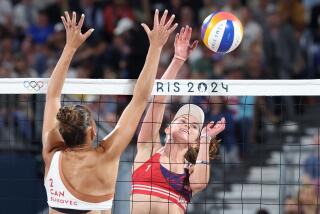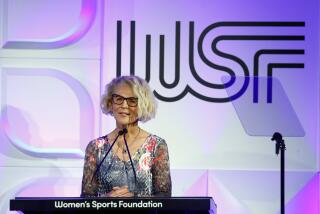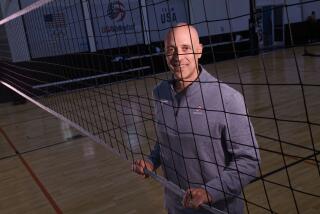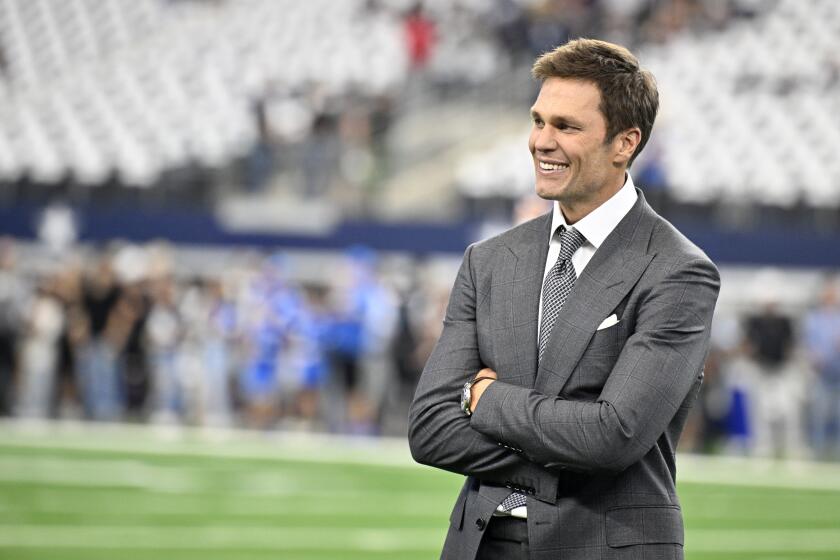Tour Is Being Reorganized in Businesslike Way
This could only happen now, with stock portfolios bulging at the seams and power brokers clapping each other on the back at the end of each day.
The Assn. of Volleyball Professionals, that wild and woolly gang of bronzed dudes from the dunes, has been bought by Spencer Trask Securities, a New York venture-capital firm.
The AVP has emerged from Chapter 11 bankruptcy proceedings with a new owner, a new chief executive and, it says, a new product.
What’s next, Karch Kiraly showing up for a match in a three-piece suit?
Truth is, someone had to tighten the financial screws on the AVP.
Nearly $4 million in prize money was awarded annually during the freewheeling days of the 1994, ’95 and ’96 tours, an amount of cash that was “artificially high,” admitted Kiraly, the only player to have won three gold medals in the Olympics and a top player for the AVP.
In recent years, the AVP’s debt rose to $2.8 million. Players were getting stiffed on their payouts. Corporate sponsors bailed, not wanting to be left holding an empty bag.
It was a bummer for the beach boys.
The AVP filed for Chapter 11 bankruptcy protection last November, then was sold in March to Spencer Trask.
Since then, the AVP has downsized, slashing prize money to $1 million and nearly halving the number of tournaments to 12.
As the suits at Spencer Trask might say, the stock is being shorted. Dividends have not been determined.
The Hermosa Beach Open in June was successful, drawing a vocal crowd that saw local neophyte David Swatik win his first pro championship. Last month in Chicago, Kiraly won his 140th tournament title, setting the record for pro beach victories. Perhaps most significant in judging the status of the AVP: 12 tournaments were planned and, by season’s end next month in Las Vegas, 12 will have been played.
The AVP has earned a further modicum of success by reinstalling the Manhattan Beach Open, dubbed “the Wimbledon of the sand,” for the first time since 1996.
A retro theme has been adopted for the tournament, which starts today and continues Sunday at the Manhattan Beach Pier, the AVP harking back to the days when beachcombers rose before the sun to reserve a spot on the sand:
There will be no bleachers. There also will be no charge.
Gone is the so-called “Green Berlin Wall,” an eight-foot hanging fence that encircled venues in 1996 to keep out nonpaying beachgoers. Ticket hikes further damaged the AVP as it tried to capitalize on the momentum of the 1996 Olympics.
Leading the about-face is Bill Berger, a former player agent who was appointed chief executive by Spencer Trask. And the faults of the recent past were glaring, according to Berger.
“They tried to legitimize [the game] too much,” he said. “They made it much too sterile. And that took the fun away.”
To get it back will take some work.
First, Berger must cajole corporate America into anteing up--again.
The AVP’s mounting debt scared away sponsors in recent years, but some are cautiously dipping a toe in the water. Sunkist has emerged as a leading candidate and backed four events this year, among them this weekend’s.
Furthermore, Berger must address domestic competition, which has arrived in the form of the fledgling Oldsmobile Alero Series. Backed by a sponsor that appears eager to invest, that series had a three-tournament schedule this summer, has scheduled six events for next year and, perhaps most important, has struck a TV deal with ESPN.
The AVP has countered by promoting its players, who make publicized appearances at restaurants and bars during weekend tournaments, mingling with fans once the day’s competition has ended.
“Volleyball is unlike a basketball game, where you show up at 7:20, get your hot dog, sit in a chair for three hours and go home,” Berger said. “Our athletes are more accessible than any other sport. People don’t want to let us go. They just want to keep having a great time.”
Next year will be pivotal for the AVP. Besides the increased competition from the Alero series, the AVP must yield to the FIVB, the international governing body, which runs the Olympic qualifying process and is more than a passing headache to the AVP.
The big-name U.S. teams, two of which will qualify for the 2000 Olympics, must compete in FIVB tournaments to earn enough points for an Olympic berth.
In other words, to be an Olympian, American teams must play--and succeed--on the international FIVB tour, leaving a possible shortage of talent on the AVP tour.
Not that AVP athletes, particularly Kiraly, a fiercely loyal voice for the AVP, are overjoyed about playing overseas.
Kiraly, 38, said he and partner Adam Johnson were “pretty miserable” during a recent three-week trip to FIVB tournaments in Spain, Portugal and Belgium.
“I didn’t get married and have kids to be away from them three weeks at a time,” Kiraly said. “When I came back, I said, ‘I’m never doing this again.’
“But at other times, I feel the Olympics are a special tournament. I’ve been there three times and it might be special to be there again.”
Ironically, Kiraly’s former partner, Sinjin Smith, carries lots of clout with the FIVB. Smith, 42, who lives in Southern California and plays on the FIVB tour, is the president of the FIVB beach volleyball world council.
He scoffs at complaints regarding the Olympic qualifying process.
“AVP players just can’t expect the rest of the world to grant them an automatic berth in the Olympics,” Smith said. “Five, six, seven years ago, the U.S. dominated. Today it’s not like that. For the Americans to say they shouldn’t have to play internationally to qualify for the Olympics is ludicrous.
“For people to complain, I think they may be a bit jaded. Maybe life’s been a little too easy for them, if traveling to the best places in the world is not what they want to do. They need to prove they are of the quality to represent the U.S. in the Olympics.”
At any rate, the AVP will have to adjust to an exodus of players as the Olympics draw closer.
For now, though, the AVP plays on. The payouts are a fourth of what they were. Competition is springing up. The tour may continue to downsize. But, in the words of Kiraly, the all-time winningest volleyball player:
“I’m just glad we have a tour. It was not at all certain we were going to. Even though the prize money is down significantly, I think of myself as very blessed, very fortunate to still be playing at one of the best offices in the world--the beach--and making a great living at it.”
(BEGIN TEXT OF INFOBOX / INFOGRAPHIC)
AVP Prize Money
Purses and top money winners on the Assn. of Volleyball Professionals Tour the past three seasons and so far this season:
*
1996: Events--23
Total Purse--$3.95 million
1. Karch Kiraly: $492,081
2. Kent Steffes: $387,581
3. Jose Loiola: $297,350
*
1997: Events--23
Total Purse--$3.53 million
1. Jose Loiola: $318,433
2. Kent Steffes: $273,433
3. Mike Whitmarsh: $161,422
*
1998: Events--21
Total Purse--$1.3 million
1. Karch Kiraly: $81,307
2. Eric Fonoimoana: $65,486
3. Adam Johnson: $61,693
*
1999: Events--12
Total Purse--$1 million
1. Karch Kiraly: $50,750
2. Adam Johnson: $50,750
3. Dain Blanton: $40,600
More to Read
Go beyond the scoreboard
Get the latest on L.A.'s teams in the daily Sports Report newsletter.
You may occasionally receive promotional content from the Los Angeles Times.











